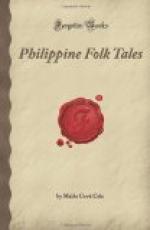A day or two later, the lieutenant also came to town, and began to make inquiries concerning the captain. He soon found out that the captain had been killed in Juan’s house, but Juan now had soldiers on guard at his door, so that it was necessary to use strategy. He went to Juan and asked if he could start a “tienda,” or wine-shop, and Juan, who recognized the lieutenant, said, “Yes.” Then the lieutenant went away, soon returning with seven great casks, in each of which he had seven men.
These he stored under Juan’s house until such time as Juan, being asleep, could be killed with certainty and little danger. When this was done, he went into the house, intending to make Juan drunk and then kill him as Juan had the captain. Juan, however, got the lieutenant drunk first, and soon his head, like the captain’s, rolled on the floor.
The soldiers below, like all soldiers, wished to have a drink from the great casks, and so one of them took a borer and bored into one of the casks. As he did so, a voice whispered, “Is Juan asleep yet?” The soldier replied, “Not yet,” and went and told Juan. The casks by his order were all put into a boat, loaded with stones and chains, and thrown into the sea. So perished the last of the robbers.
Juan, being no longer in fear of the robbers, often went to their cave, and helped himself to everything that he wanted. He finally became a very great and wealthy man. [16]
CHAPTER 13
The Covetous King and the Three Children.
There were once three orphan children, the oldest of whom was perhaps ten years old, and the others but little things, almost babies. They had a tiny little tumble-down house to live in, but very little to eat. Said the eldest to his little brother and sister, “I will go yonder on the sands laid bare by the falling tide, and it may be that I shall find something that we can eat.” The little children begged to go, too, and they all set out over the sands. Soon they found a large living shell. “Thanks be to God,” said the boy, for he was well instructed, “we shall have something to eat.” “Take me home, but do not cook me,” said the shell, “and I will work for you.” Now this was probably the Holy Virgin herself, in the form of a shell, who had taken pity on the poor children. They took the shell home, and there it spoke again. “Put me into the rice pot, cover me up, and you shall turn out plenty of boiled rice for all of you.” And they did so, and the boiled rice came from the pot. “Now put me into the other pot, and take out ulam.” And they took out ulam in abundance. “Have you a clothes chest?” asked the shell; but there was none, so they put it into a box, and the box became filled with clothing. Then the shell filled the spare room with rice, and last of all filled another large box with money.
Now the king of this city was a cruel man, and he sent for the children and told them that they must give up their money, their rice and all to him and be poor again. “O dear king,” said the oldest child, “will you not leave us a little for our living?” “No,” replied the king, “I will give you as much boiled rice as you need, and you ought to be glad that you get it.”




